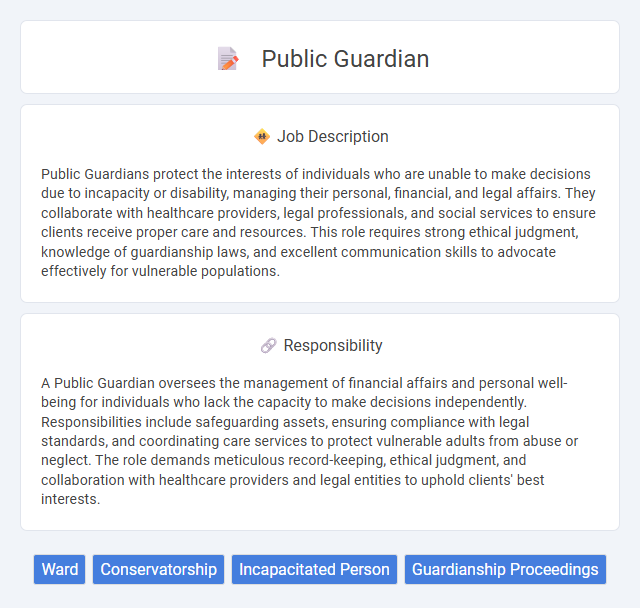
Public Guardians protect the interests of individuals who are unable to make decisions due to incapacity or disability, managing their personal, financial, and legal affairs. They collaborate with healthcare providers, legal professionals, and social services to ensure clients receive proper care and resources. This role requires strong ethical judgment, knowledge of guardianship laws, and excellent communication skills to advocate effectively for vulnerable populations.
Individuals with a strong sense of empathy and excellent communication skills are likely suitable for the Public Guardian role, which involves supporting vulnerable people who may be unable to manage their own affairs. Candidates who exhibit patience, sound judgment, and a commitment to ethical decision-making are probably well-suited to navigate complex personal and legal situations. Those who find it challenging to handle emotional stress or make impartial decisions might face difficulties in this position.
Qualification
A Public Guardian must possess a bachelor's degree in social work, law, psychology, or a related field, with many roles requiring a master's degree for advanced responsibilities. Professional certification or licensure in guardianship or social services enhances credibility and demonstrates compliance with regulatory standards. Strong knowledge of legal frameworks, ethics, and case management is essential for effective advocacy and protection of vulnerable individuals.
Responsibility
A Public Guardian oversees the management of financial affairs and personal well-being for individuals who lack the capacity to make decisions independently. Responsibilities include safeguarding assets, ensuring compliance with legal standards, and coordinating care services to protect vulnerable adults from abuse or neglect. The role demands meticulous record-keeping, ethical judgment, and collaboration with healthcare providers and legal entities to uphold clients' best interests.
Benefit
Serving as a Public Guardian likely provides the significant benefit of protecting vulnerable individuals who cannot make decisions for themselves, ensuring their rights and interests are upheld. The role probably offers a sense of fulfillment and public service by advocating for the welfare of those under guardianship. It may also enhance skills in legal matters, decision-making, and ethical considerations, which are valuable in various professional contexts.
Challenge
The role of a Public Guardian probably involves navigating complex legal and ethical challenges, especially when making decisions for individuals who cannot advocate for themselves. Managing conflicting interests among family members and ensuring compliance with evolving regulations may present ongoing difficulties. The position likely demands strong problem-solving skills and resilience to handle emotionally charged situations effectively.
Career Advancement
A Public Guardian career offers substantial opportunities for advancement through specialization in estate management, legal compliance, and advocacy for incapacitated individuals. Professionals can progress from case management roles to supervisory positions, policy development, or become experts in guardianship law and ethics. Continuous education and certification in mental health law or social work significantly enhance promotion prospects within this field.
Key Terms
Ward
A Public Guardian is responsible for managing the financial, legal, and personal affairs of wards who are unable to make decisions for themselves due to incapacity or disability. They ensure the protection of a ward's rights and interests while coordinating care and safeguarding assets according to court orders and legal standards. Public Guardians work closely with healthcare providers, legal representatives, and social services to promote the well-being and dignity of wards.
Conservatorship
Public Guardians specialize in managing conservatorships, providing legal and financial oversight for individuals unable to care for themselves due to incapacitation or disability. They coordinate with healthcare providers, manage assets, and ensure compliance with court mandates, safeguarding the ward's best interests. Expertise in guardianship law and fiduciary responsibility is essential for effective public conservatorship administration.
Incapacitated Person
A Public Guardian plays a crucial role in overseeing the welfare and financial interests of incapacitated persons who cannot manage their own affairs due to mental or physical impairments. This position involves making decisions about healthcare, living arrangements, and legal matters to protect the rights and dignity of vulnerable individuals. Public Guardians are appointed by courts and collaborate with medical professionals, social workers, and legal advisors to ensure comprehensive support.
Guardianship Proceedings
Public Guardians oversee Guardianship Proceedings by managing legal responsibilities for individuals unable to make decisions due to incapacity. They ensure the protection of vulnerable adults' rights while coordinating with courts to establish or modify guardianship orders. Expertise in legal frameworks, ethical standards, and case management is essential for effective public guardianship.
 kuljobs.com
kuljobs.com